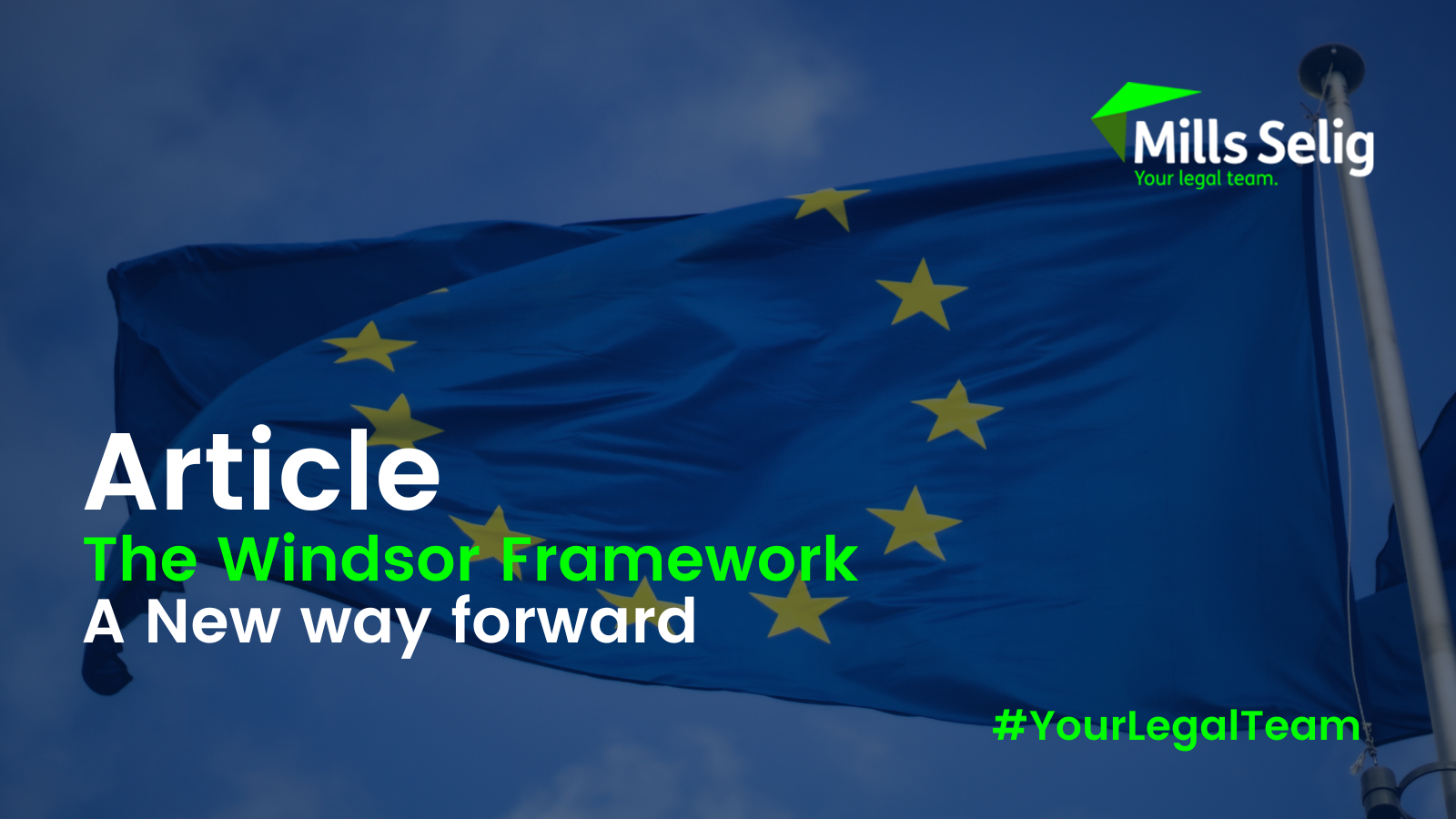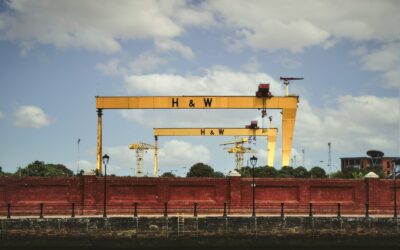The Windsor Framework was announced on 27 February 2023 by UK Prime Minister, Rishi Sunak and Ursula von der Leyen, EU Commission President. This amended the previously agreed set of trading arrangements particular to Northern Ireland following Brexit, known as the Northern Ireland Protocol.
Northern Ireland Protocol
The original protocol’s purpose was to ensure that Northern Ireland remained within the EU Single Market, customs union and animal health and safety regimes whilst also ensuring that Northern Ireland had unfettered access to the UK internal market. In practice, the protocol restricted trade between Northern Ireland and the rest of the UK, eased only by grace periods and exemptions. The objective of the Windsor Framework is to solve the practical and logistical issues arising out of the protocol to allow NI businesses to avail of the opportunity to access both UK and EU markets.
What are the new arrangements?
Customs and the movement of goods
The Framework creates a new system for goods moving to and from NI. Simplified customs requirements and reduced checks will be available in the so-called “green lane” for goods that are destined for NI and a more stringent “red lane” of customs checks for goods at risk of entering the EU single market.
The green lane will work on the basis of an internal trusted trader scheme (UK Internal Market Scheme), with businesses throughout the UK being eligible rather than having to be physically established in NI. UK businesses will be eligible if:
- The annual turnover of the entities processing is less than £2million; or
- In the event that the annual turnover of that entity is above the £2 million threshold, the goods being processed are for use in the sale of retail food to consumers, animal feed, healthcare, construction and not for profit sectors.
The UK Government has stressed that accessing the green lane via the UK Internal Market Scheme will be via a “once and done” registration process. Any business already registered on the UK Trader Scheme will automatically be registered for the new scheme.
Food products
Agri-food is especially sensitive because 75% of food in NI’s supermarkets comes from the UK. The EU has agreed that UK public health and safety standards will apply to retail food and drink within NI. If the product is available in GB, it will be available in NI. More than 60 EU food and drink rules in the original protocol have been removed. However, food products sold in NI must phase in labels by 1 July 2025 which state that the product is “Not for EU”. The government will provide financial support to assist businesses with the labelling changes.
There will be an introduction of a single certificate for mixed loads of agri-goods, moving away from multiple certificates and veterinary inspections. Physical checks are to be carried out on an ‘at risk’ and intelligence approach. It is anticipated that by the end of 2023, only 10% of lorries will be subject to visual inspection and this will reduce to 5% when the labelling requirements are fully implemented.
To protect the Single Market, the UK is constructing operational SPS Inspection facilities and will provide the EU with access to relevant IT databases.
Online shopping
Under the original protocol all goods being sent from GB businesses to NI consumers would require a customs declaration. The new arrangements will revoke this requirement if the goods are sent using authorised parcel operators. Authorised parcel operators will have to share data with the government to monitor the final destination of goods.
Goods being sent from GB consumers to NI consumers will have all customs requirements waived entirely, ensuring a return to the arrangements prior to the protocol.
Plants and seeds
All plants and seeds will move under the already existing UK plant passport scheme. Products such as the previously banned seed potatoes and 11 other native plant species will once again be available in NI, and they will be labelled and dispatched by authorised operators.
Steel safeguards
The EU has agreed to allow access to EU tariff rate quotas for UK origin steel moving from the UK to NI. This will allow NI businesses to bypass the EU’s 25% steel safeguards tariff.
Medicines and pharmaceuticals
Human medicines for distribution in NI will be authorised by the UK Medicines and Healthcare Products Regulatory Agency rather than the European Medicines Agency. This will enable manufacturers to produce a single medicine pack for the whole of the UK rather than a specific NI pack.
The EU’s Falsified Medicines Directive will be disapplied for medicines being supplied to NI.
VAT and excise
Northern Ireland will now be subject to the same VAT and excise rules as apply in the rest of the UK. This will allow Northern Ireland to apply a reduced rate to a wider range of goods including goods supplied and installed in immovable property located in NI even if the applicable UK VAT is below EU minimum rates.
The UK can apply their own duty structure to alcohol as long as minimum EU excise rates are respected and there is no discriminatory treatment of EU products.
Stormont Brake
Under the original protocol, EU customs laws continue to apply to NI as a measure of protecting the Single Market despite the UK not having any representation or voting rights in the EU policy making process. The new Framework has introduced a mechanism called the “Stormont Brake” which is an attempt to deal with this democratic deficit.
In the event that the EU seeks to amend or replace EU legislation applicable to NI, the “Stormont Brake” allows the Northern Ireland Assembly to object using the emergency mechanism. MLAs must state their reasoning for using the mechanism and it is only to be used if it is to cause “a significant impact specific to everyday life that is liable to persist”. It is not designed to be used lightly and could lead to arbitration with the EU if the new legislation is suspended.
There is no specific timeframe for the implementation of the Framework and the UK and EU have jointly committed to implementing all solutions expeditiously and in good faith. However, its implementation will have various implications for businesses trading in and out of Northern Ireland and they should keep informed of any developments.
Editorial by Glenn Watterson, Partner, Corporate @ Mills Selig #YourLegalTeam
If you have any queries regarding the information provided above, please feel free to get in touch with the Corporate team @ Mills Selig

Glenn Watterson is a Partner within Mills Selig’s Corporate team.
Glenn Watterson leads the pack of next-generation corporate lawyers in Northern Ireland. Now in his fourteenth year with the firm, Glenn has gained significant expertise in both corporate and commercial matters, and leads teams from Mills Selig in mergers and acquisitions across mainly the IT, energy and hospitality sectors.
T: 028 9044 5423
E: Glenn.Watterson@MillsSelig.com
W: https://millsselig.com/team/glenn-watterson/
Having the right legal advice at the right time is crucial – our expert team offers clear, concise and problem solving legal advice.
For further information on Mills Selig’s expert legal services and how we can help your organisation, click: https://millsselig.com/our-expertise/
#YourLegalTeam #Understanding #Expertise #Experience




